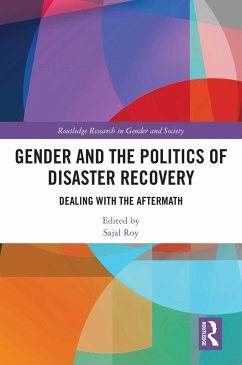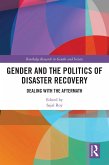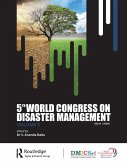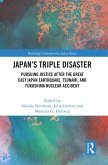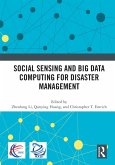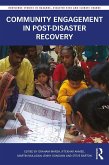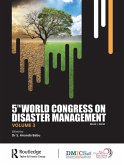Gender and the Politics of Disaster Recovery (eBook, PDF)
Dealing with the Aftermath
Redaktion: Roy, Sajal
43,95 €
43,95 €
inkl. MwSt.
Sofort per Download lieferbar

22 °P sammeln
43,95 €
Als Download kaufen

43,95 €
inkl. MwSt.
Sofort per Download lieferbar

22 °P sammeln
Jetzt verschenken
Alle Infos zum eBook verschenken
43,95 €
inkl. MwSt.
Sofort per Download lieferbar
Alle Infos zum eBook verschenken

22 °P sammeln
Gender and the Politics of Disaster Recovery (eBook, PDF)
Dealing with the Aftermath
Redaktion: Roy, Sajal
- Format: PDF
- Merkliste
- Auf die Merkliste
- Bewerten Bewerten
- Teilen
- Produkt teilen
- Produkterinnerung
- Produkterinnerung

Bitte loggen Sie sich zunächst in Ihr Kundenkonto ein oder registrieren Sie sich bei
bücher.de, um das eBook-Abo tolino select nutzen zu können.
Hier können Sie sich einloggen
Hier können Sie sich einloggen
Sie sind bereits eingeloggt. Klicken Sie auf 2. tolino select Abo, um fortzufahren.

Bitte loggen Sie sich zunächst in Ihr Kundenkonto ein oder registrieren Sie sich bei bücher.de, um das eBook-Abo tolino select nutzen zu können.
Drawing a transdisciplinary perspective, this book investigates the ways in which gender intersect with rebuilding and post-disaster recovery process.
- Geräte: PC
- mit Kopierschutz
- eBook Hilfe
Andere Kunden interessierten sich auch für
![Gender and the Politics of Disaster Recovery (eBook, ePUB) Gender and the Politics of Disaster Recovery (eBook, ePUB)]() Gender and the Politics of Disaster Recovery (eBook, ePUB)43,95 €
Gender and the Politics of Disaster Recovery (eBook, ePUB)43,95 €![Disaster Law (eBook, PDF) Disaster Law (eBook, PDF)]() Disaster Law (eBook, PDF)41,95 €
Disaster Law (eBook, PDF)41,95 €![5th World Congress on Disaster Management: Volume V (eBook, PDF) 5th World Congress on Disaster Management: Volume V (eBook, PDF)]() 5th World Congress on Disaster Management: Volume V (eBook, PDF)166,95 €
5th World Congress on Disaster Management: Volume V (eBook, PDF)166,95 €![Japan's Triple Disaster (eBook, PDF) Japan's Triple Disaster (eBook, PDF)]() Japan's Triple Disaster (eBook, PDF)43,95 €
Japan's Triple Disaster (eBook, PDF)43,95 €![Social Sensing and Big Data Computing for Disaster Management (eBook, PDF) Social Sensing and Big Data Computing for Disaster Management (eBook, PDF)]() Social Sensing and Big Data Computing for Disaster Management (eBook, PDF)43,95 €
Social Sensing and Big Data Computing for Disaster Management (eBook, PDF)43,95 €![Community Engagement in Post-Disaster Recovery (eBook, PDF) Community Engagement in Post-Disaster Recovery (eBook, PDF)]() Community Engagement in Post-Disaster Recovery (eBook, PDF)43,95 €
Community Engagement in Post-Disaster Recovery (eBook, PDF)43,95 €![5th World Congress on Disaster Management: Volume III (eBook, PDF) 5th World Congress on Disaster Management: Volume III (eBook, PDF)]() 5th World Congress on Disaster Management: Volume III (eBook, PDF)52,95 €
5th World Congress on Disaster Management: Volume III (eBook, PDF)52,95 €-
-
-
Drawing a transdisciplinary perspective, this book investigates the ways in which gender intersect with rebuilding and post-disaster recovery process.
Dieser Download kann aus rechtlichen Gründen nur mit Rechnungsadresse in A, B, BG, CY, CZ, D, DK, EW, E, FIN, F, GR, HR, H, IRL, I, LT, L, LR, M, NL, PL, P, R, S, SLO, SK ausgeliefert werden.
Produktdetails
- Produktdetails
- Verlag: Taylor & Francis eBooks
- Seitenzahl: 256
- Erscheinungstermin: 22. Juli 2022
- Englisch
- ISBN-13: 9781000615616
- Artikelnr.: 64273448
- Verlag: Taylor & Francis eBooks
- Seitenzahl: 256
- Erscheinungstermin: 22. Juli 2022
- Englisch
- ISBN-13: 9781000615616
- Artikelnr.: 64273448
- Herstellerkennzeichnung Die Herstellerinformationen sind derzeit nicht verfügbar.
Sajal Roy is a Research Fellow at the Centre for Social Impact, UNSW Business School, University of New South Wales. Previously he held a Postdoctoral Research Fellow position at the Centre for Livelihoods and Wellbeing, University of Technology Sydney, Australia. He is a scholar in critical development studies and human geography specialising in climate change social sciences, smart city development, sustainable livelihoods and development, gendered relations, refugee crisis management and climate justice. Sajal received his PhD in Climate Change Social Science in 2021. Dr Roy has taught several courses in Social sciences and Business Studies at Western Sydney University, University of Wollongong, and Australian Catholic University. Funded by the Department of Foreign Affairs and Trade, in collaboration with Griffith Asia Centre, Griffith University, Sajal has recently completed a collaborative research project titled Gender and Leadership Inclusion in LAOS. With Taylor and Francis, his latest book is entitled Climate Change and Gendered Livelihoods in Bangladesh (2021).
1. Understanding Gendered Context of Post-Disaster Recovery: An Overview
2. Integrating a Gender Perspective into Disaster Risk Management: An
Analysis of the Global Assessment Reports on Disaster Risk Reduction
3. Local Governments' Provisions and Sections in Disaster: Lesson Learned
from the Post-Pandemic Era
4. Indian Disaster Diplomacy in South Asian Region
5. Risk Perception and Disaster Management of Women in Dealing with Floods
in Urban Indonesia
6. Adapting Livelihoods in the Face of Climate Change: A Study of Sherpa
Households from the Khumbu (Everest) Region, Nepal
7. Unlocking the Potential of Microfinance towards Sustainable Livelihoods
for Climate Change Adaptation
8. Climate Change, Women Migrants and the Potentialities of Intersectional
Analysis in the Reconquista River Basin, Buenos Aires, Argentina
9. The Local Heritage 'Dhopkols': Build Back Better Water Access in
Reducing Gender-Based Vulnerabilities in Bangladesh
10. Financing Climate-Induced Disaster Management: How to Engage the Formal
Financial Sector?
11. Gendered Vulnerabilities and Adaptive Options in Fisher Communities of
Coastal Bangladesh during COVID-19 Pandemic
12. Gender Dimensions in Disaster Risks Reduction Policy: Insights from
Bangladesh
13. Concluding Remarks: The State of the Art of Research in Gender,
Disaster and Cultural Studies
2. Integrating a Gender Perspective into Disaster Risk Management: An
Analysis of the Global Assessment Reports on Disaster Risk Reduction
3. Local Governments' Provisions and Sections in Disaster: Lesson Learned
from the Post-Pandemic Era
4. Indian Disaster Diplomacy in South Asian Region
5. Risk Perception and Disaster Management of Women in Dealing with Floods
in Urban Indonesia
6. Adapting Livelihoods in the Face of Climate Change: A Study of Sherpa
Households from the Khumbu (Everest) Region, Nepal
7. Unlocking the Potential of Microfinance towards Sustainable Livelihoods
for Climate Change Adaptation
8. Climate Change, Women Migrants and the Potentialities of Intersectional
Analysis in the Reconquista River Basin, Buenos Aires, Argentina
9. The Local Heritage 'Dhopkols': Build Back Better Water Access in
Reducing Gender-Based Vulnerabilities in Bangladesh
10. Financing Climate-Induced Disaster Management: How to Engage the Formal
Financial Sector?
11. Gendered Vulnerabilities and Adaptive Options in Fisher Communities of
Coastal Bangladesh during COVID-19 Pandemic
12. Gender Dimensions in Disaster Risks Reduction Policy: Insights from
Bangladesh
13. Concluding Remarks: The State of the Art of Research in Gender,
Disaster and Cultural Studies
1. Understanding Gendered Context of Post-Disaster Recovery: An Overview
2. Integrating a Gender Perspective into Disaster Risk Management: An
Analysis of the Global Assessment Reports on Disaster Risk Reduction
3. Local Governments' Provisions and Sections in Disaster: Lesson Learned
from the Post-Pandemic Era
4. Indian Disaster Diplomacy in South Asian Region
5. Risk Perception and Disaster Management of Women in Dealing with Floods
in Urban Indonesia
6. Adapting Livelihoods in the Face of Climate Change: A Study of Sherpa
Households from the Khumbu (Everest) Region, Nepal
7. Unlocking the Potential of Microfinance towards Sustainable Livelihoods
for Climate Change Adaptation
8. Climate Change, Women Migrants and the Potentialities of Intersectional
Analysis in the Reconquista River Basin, Buenos Aires, Argentina
9. The Local Heritage 'Dhopkols': Build Back Better Water Access in
Reducing Gender-Based Vulnerabilities in Bangladesh
10. Financing Climate-Induced Disaster Management: How to Engage the Formal
Financial Sector?
11. Gendered Vulnerabilities and Adaptive Options in Fisher Communities of
Coastal Bangladesh during COVID-19 Pandemic
12. Gender Dimensions in Disaster Risks Reduction Policy: Insights from
Bangladesh
13. Concluding Remarks: The State of the Art of Research in Gender,
Disaster and Cultural Studies
2. Integrating a Gender Perspective into Disaster Risk Management: An
Analysis of the Global Assessment Reports on Disaster Risk Reduction
3. Local Governments' Provisions and Sections in Disaster: Lesson Learned
from the Post-Pandemic Era
4. Indian Disaster Diplomacy in South Asian Region
5. Risk Perception and Disaster Management of Women in Dealing with Floods
in Urban Indonesia
6. Adapting Livelihoods in the Face of Climate Change: A Study of Sherpa
Households from the Khumbu (Everest) Region, Nepal
7. Unlocking the Potential of Microfinance towards Sustainable Livelihoods
for Climate Change Adaptation
8. Climate Change, Women Migrants and the Potentialities of Intersectional
Analysis in the Reconquista River Basin, Buenos Aires, Argentina
9. The Local Heritage 'Dhopkols': Build Back Better Water Access in
Reducing Gender-Based Vulnerabilities in Bangladesh
10. Financing Climate-Induced Disaster Management: How to Engage the Formal
Financial Sector?
11. Gendered Vulnerabilities and Adaptive Options in Fisher Communities of
Coastal Bangladesh during COVID-19 Pandemic
12. Gender Dimensions in Disaster Risks Reduction Policy: Insights from
Bangladesh
13. Concluding Remarks: The State of the Art of Research in Gender,
Disaster and Cultural Studies
